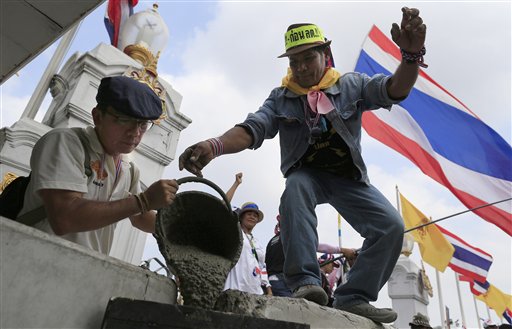Thai farmers put pressure on PM over rice payments

Anti-government protesters pour cement on concrete barriers to seal the gate of the prime minister’s office of government house during a rally in Bangkok, Thailand, Monday, Feb. 17, 2014. AP
BANGKOK, Thailand—Hundreds of disgruntled Thai farmers breached razor-wire barricades outside the prime minister’s temporary office Monday to protest the government’s delayed payments from last year’s rice crops.
A flagship policy of Yingluck Shinawatra’s government was to buy rice at above-market prices, aiming to woo votes from millions of farmers. But the program has accumulated losses of at least $4.46 billion and has been dogged by corruption allegations.
Government officials said payments were delayed because protesters triggered parliament’s dissolution in December. The finance minister said the government would issue payments starting Monday through a state-owned bank.
It is one of the latest headaches for Yingluck, who has been forced to work at the temporary office since late last year after the protesters surrounded her office in central Bangkok demanding her resignation.
The farmers used a farming truck to trample razor wires, then shoved the guarding soldiers and attempted to surround the office compound in Bangkok’s northern outskirts. They demanded Yingluck meet them in person to answer when and if they will be paid, as the payments are several months overdue.
Article continues after this advertisement“We want the prime minister to come down to talk to us,” Rawee Rungreuang, a farmers’ representative told reporters outside the Office of the Permanent Secretary for Defense. “We have sympathized with the government for four months now. It’s time for an answer.”
Article continues after this advertisementCaretaker Finance Minister Kittiratt Na-Ranong said the government has paid 65 billion baht ($2 billion) and owes 110 billion baht ($3.39 billion) to the farmers.
He said the government will start paying the rest of the money through the state-owned agricultural bank.
“Considering the (bank’s) capacity in handling daily payments, it is expected that all payments will be made within six to eight weeks,” Kittiratt told reporters at a news conference.
The farmers previously blocked main highways in several parts of the country and came to the capital this month to demand their payments.
The anti-government demonstrators who’ve been protesting for three months mostly draw their support from the urban middle and upper class and those in the south. They want Yingluck’s democratically elected government to make way for an interim, appointed government to implement what they say are necessary reforms to fight corruption.
The government’s special security command center’s director and caretaker Labor Minister Chalerm Yubumrung said the Government House, where the prime minister works, will reopen this week, prompting resistance from the protesters who marched to surround the office with some pouring cement to seal the gate entrances.
At least 10 people have been killed and more than 600 injured in the three-month-old political conflict.
RELATED STORIES
Thai declares state of emergency for protests